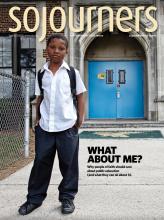ON A WINDY morning this March, as the Supreme Court began hearing oral arguments about the health-care reform law, the Affordable Care Act (ACA), hundreds of people of faith gathered in front of the court building. As part of a public witness, they prayed and carried signs that proclaimed “People of Faith for Health Care.” Participants came from various faith traditions and denominations, many of which also signed an amicus brief in support of the ACA’s expansion of Medicaid to cover more low-income adults. The event was organized by two interfaith coalitions, Faithful Reform in Health Care and the Washington Interreligious Staff Community (WISC) Health Care Working Group.
The groups involved were motivated not by political beliefs but by a moral imperative, shared across faith traditions, to build a just society that cares for the poor, the sick, the widow, the orphan, and “the least of these.”
Those who gathered believe that their prayers on behalf of the uninsured were heard when, almost three months later to the day, the Supreme Court upheld the ACA. Chief Justice John Roberts’ vote with the more liberal justices led to the unlikely majority that provided a major step forward in the century-long struggle for health-care justice in the U.S.
Read the Full Article
